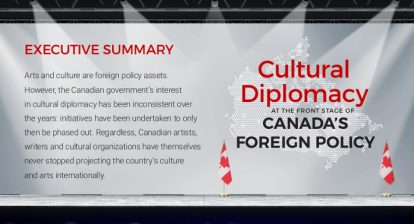July 18, 2017 – One month after the release of a draft position statement regarding the modernization of NAFTA, CAPACOA is pleased to be releasing a complete brief on Artist Mobility Between Canada and the United States.
This brief was expanded from the initial draft with input from Canadian and U.S. performing arts stakeholder. It examines work regulations on both sides of the border and calls for a better alignment of NAFTA with Canada’s progressive regulations. The brief specifically recommends amending NAFTA so that Canadian touring artists can more easily enter the U.S. for live performance engagements:
“With respect to labour mobility between Canada and the United States, CAPACOA recommends the amendment of subsection 214.6 of NAFTA, in order to add “Performing Artist” as an eligible profession for NAFTA Professional (TN) Nonimmigrant Status, with the objective of more closely aligning NAFTA with the Canadian regulations R186(g) and R205(b), C23.”
This brief was provided to the Canadian government, as part of the public consultation on the renegotiation of NAFTA. It was also shared within the Ad Hoc Cultural Sector Advisory Group on International Trade.
David vs. Goliath
Announcing CAPACOA’s priorities one day after the Trump administration released its objectives for the NAFTA renegotiation, the gap strikes the mind: the small $2.5 billion Canadian live performance sector may not weigh heavily compared to our giant neighbour’s priorities. However, the U.S. document does confirm that labour will be on the negotiation table, with the intention of “[bringing] the labor provisions into the core of the Agreement rather than in a side agreement.” This is precisely the kind opening that was needed for including performing artists into the list of NAFTA professionals. Moreover, the U.S. priority list includes Trade Services objectives such as “Improve the transparency and predictability of the regulatory procedures in the NAFTA countries.” Wouldn’t more predictability be nice for Canadian performing artists entering the U.S.?
There are other U.S. negotiation objectives that could bear impact on the broader cultural sector, including in the areas of telecommunications, digital trade, investment, and intellectual property. CAPACOA stands behind all cultural exemption and cultural diversity claims made by cultural industries associations with regards to these different topics.
Uniting for Progressive Mobility Reform
CAPACOA is also pleased to announce that it joined the Artist Mobility Advocacy Coalition (AMAC). This is an ad hoc coalition of U.S. and international arts organizations, NGOs, and private stakeholders committed to improving the U.S. artist visa process.
In joining the AMAC, CAPACOA also endorsed the White Paper on Artist Mobility to the United States. This White Paper was developped by Tamizdat following a rigorous research and consultation process. It proposes a number of specific changes to the regulations, administrative manuals, and other legal authorities that govern artist mobility to the U.S.
Recent and Related News
Labour Mobility: Could NAFTA be the Alternative?
A Change and New Challenges for Canadian Artists Entering the U.S.





